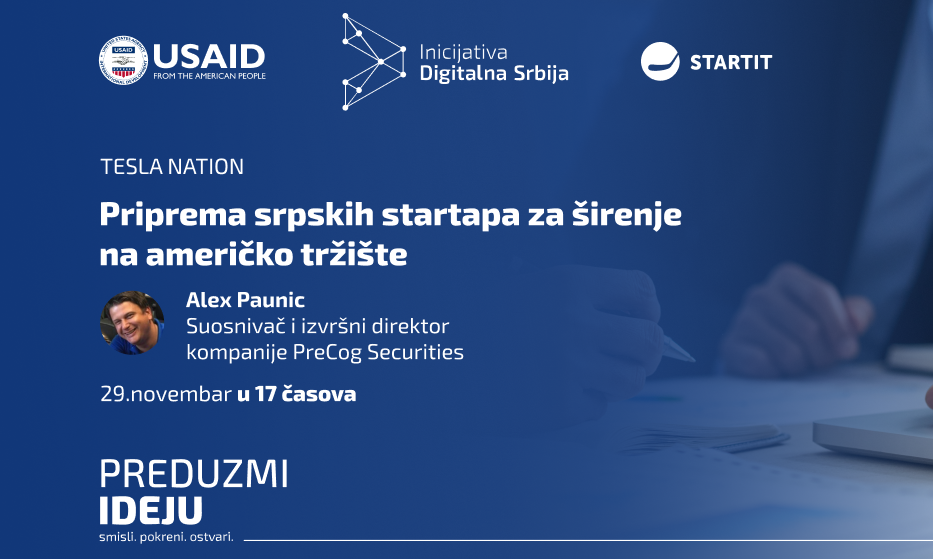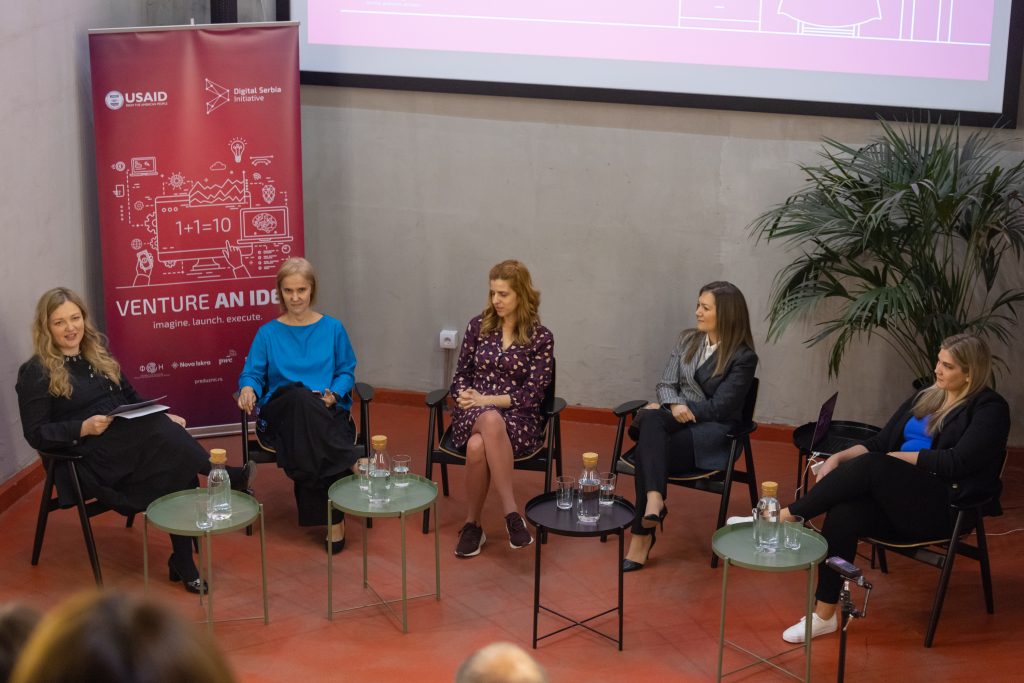On the 12th of October 2022 two USAID-backed projects organized SPLET Tech, the largest conference on innovation and tech entrepreneurship in the Western Balkans. It was the first time all of the ecosystem aligned around a vision that the future of Serbia lies in technological development, based on knowledge and innovation.
SPLET Tech brought together all relevant stakeholders in the innovation ecosystem for a massive one-day conference with 8 parallel tracks and 70+ speakers. Estimated 2000 participants, coming from an array of backgrounds, had an opportunity to find out how good ideas become successful entrepreneurial ventures, and to learn about current topics in the fields of gaming, virtual reality, the blockchain, biotechnology, artificial intelligence, and medicine.
Over the past decade, the emerging innovation ecosystem in Serbia began to take shape – first bootstrapped startups debuted on the world market, and then came first investments and acquisitions, support organizations started to create the first homebrewed support programs and the Government started to invest in business incubators in major Serbian cities. As products developed in Serbia started to get international recognition and development of the Tech sector began to intensify, we saw an immense opportunity for designed intervention in order to accelerate economic growth, thereby increasing equitable prosperity.
“A few years back, USAID made a strategic decision to enter the innovation market and help Serbia thrive in a knowledge-based economy. Over the past decade, we have witnessed the rapid growth of the technology sector in Serbia, its revenues and exports. However, there is still a lot of work to be done, especially regarding systemic support for the emerging innovation ecosystem, as well as in the field of innovative solutions and talents for the development of Serbia. That is why we have supported these projects “Serbia Innovates” and “Venture an Idea”, to use the innovative potential that Serbia has, to cultivate an entrepreneurial spirit and to help in creation of better-paid jobs. We want to see new opportunities for young and talented people to achieve their aspirations in Serbia,” said Shenli Pinchotti, Director of the Office for Democratic and Economic Development at USAID when announcing the conference.
We Brought Together all Relevant Stakeholders in the Innovation Ecosystem
According to Startup Genome analysis, for the current development phase of the Serbian ecosystem, an increase in the local connectedness in the ecosystem is one of the key success factors that will enable its future growth. That is how and why SPLET Tech came to life – to impact both local and regional development of the innovation ecosystem and the creation of new opportunities for domestic industry and society as a whole.
Let’s stop for a second to take a closer look at the different ecosystem actors who came together at SPLET Tech.
- Startup founders coming from some of the most promising Serbian startups (to name a few: Tenderly, All.art, Fishing Booker, Finspot, Bitbell, etc)
- Faculty professors from several Serbian Universities (Belgrade, Kragujevac, Niš, Novi Sad)
- Researchers from leading scientific and research organizations (Biosense Institute, Institute of Molecular Genetics and Genetic Engineering, AI institute, Institute for Medical Statistics and Informatics, etc)
- “Smart money” investors, including DSI Business Angel Group members and several VC Funds (TS Fund, South-Central Ventures, Eleven, Launch Hub, Fil Rouge Capital, etc)
- Domestic Startup support organizations providing assistance to startups from earliest stages (Digital Serbia Initiative, ICT Hub, NTP Čačak, Nova Iskra, NEAR Balkans Hub, Startit, NTP Niš, etc)
- Ecosystem community organizations sharing knowledge and creating Pay-it-Forward culture (Serbian Blockchain Initiative, Serbian Gaming Association, Nordeus Foundation, etc)
- International development agencies world-class expertise to stimulate the growth of ecosystem (USAID, GIZ, JICA, Swiss EP, World bank)
- Domestic Tech companies developing products for the world market (MVP Workshop, Vega, Centili, Vtool)
- Global R&D centers who established their operations in Serbia to great engineering talent (Microsoft Development Centre Serbia, Bosch Development Centre, Schneider Electric Hub)
- Embassies (Israel, Czech Republic, Finland, Switzerland etc)
- Students from several cities (Belgrade, Novi Sad, Kragujevac, Čačak, Niš)
The list goes on. How often do we see all these stakeholders in the same place? Hardly ever. And while in some countries scientific and research centers work closely with the private sector, we lack this cooperation in Serbia and that is where projects Serbia Innovates, implemented by ICT Hub, and Venture an Idea, initiated by the consortium gathered around Digital Serbia Initiative saw the opportunity to join forces and resources to really make a difference.
“We have witnessed the constant development of the IT sector in Serbia in recent years, and that is a fact that affects the shaping of trends and general flows in other areas as well. Different products developed by teams in IT companies are implemented in others spheres and thus enable the acceleration of the process of digitization and application of innovative solutions. The growth of the IT sector means at the same time progress for the domestic economy and the opening of different business opportunities for both individuals and organizations,” said Zoran Vasiljev, CEO of Centili Group.
“For the first time, we managed to bring together different participants of the innovation ecosystem with a unique vision – the vision that the future of Serbia is in technological development, based on knowledge and innovation”, explained the directors of these two projects, Aleksandra and Nebojša, and added “SPLET will be talked about much after the day of the conference. This was precisely our idea – to create an atmosphere in the community that will continuously encourage new innovations and development of successful businesses.”
Saša Popović, CEO of Vega IT and investor, highlighted the potential of SPLET Tech “This conference should enable the establishment of additional acquaintances within the ecosystem, and then the sharing of knowledge and experiences among the members. I expect this and other similar events will motivate other individuals and companies to start investing in domestic startups in order to diversify their investments and at the same time contribute to increasing the standard of living in Serbia”.
Bridging the Gap Between Academia and Private Sector
Scientific institutions in Serbia are continuously producing research and innovative ideas, however, a lot of these products haven’t been commercialized. One of our aims at SPLET Tech was to improve connections between business and academia thus boosting relevant and up-to-date innovation activities.
To put this in a wider perspective, let’s give you a closer look at who spoke at SPLET Tech. It is less known that the director of the SLICE Laboratory at the University of Berkley comes from Serbia. Another example is the domestic scale-up Seven Bridges Genomics which built some of the most advanced cloud computing platforms for genomics data analysis. Both professor Nikolić from UC Berkeley and serial entrepreneur Igor Bogićević, co-founder of Seven Bridges currently growing startup called Orgnostic, were among the keynote speakers at the SPLET Tech. Ivan Bjelajac, founder of the most successful local company working in Web 3 technologies talked about the new approach to venture building, and Dr. Jasmina Knezevic, the CEO of the first private healthcare system in Serbia joined the panel to present her experience in working with startups. Numerous entrepreneurs, C-level managers, university professors and researchers enriched the event with their participation. The main underlying topic of the SPLET Tech was the importance of commercialization and multidisciplinarity because innovation itself is not enough, it needs to be productized, commercialized and made successful on the market.
“At the SPLET Tech we were for the first time introduced to the Expert2Mentors training program and the Route2Launch mentoring program, which are currently being implemented at the Faculty of Organizational Sciences, and they attracted our great interest due to the systemic approach, developed in order to improve startup mentoring capacities among the teaching staff. The presented system recognizes the academic community as an environment with huge potential to motivate students to build their own startups.”, said the Rector of the University of Kragujevac, Prof. Dr. Nenad Filipović.
SPLET Tech is Bringing the Region Together
Although not originally intended as a regional event in its first iteration, SPLET Tech proved otherwise from the very start. Some of the most active regional stakeholders recognized the potential of SPLET Tech and joined the process, paving the road for the future growth of the conference.
Western Balkans Startup Alliance brought in startups from WB countries and held a panel “The way forward for a regional entrepreneurship ecosystem”. At SPLET Tech, Digital Serbia Initiative officially launched The NINJA accelerator program, a new program supported by the Japan International Cooperation Agency (JICA), with the goal to select promising local startups in a mature stage of development and upgrade their operations and expand it to countries where they haven’t done business before.
There was a special interest in the public pitching session held on the main stage, where startups pitched their ideas to dozen of VC fund representatives in front of several hundred people in the audience. Venture Funds came for this event from a wider region, including Bulgaria, Croatia, and Slovenia. At “Why Serbia?”, a meetup also held as part of the SPLET Tech, expats living in Serbia including Keo Sar from the United States, David Tabachnikov and Hagai Arbel from Israel spoke firsthand about the perspectives of life and work from Belgrade and Serbia.These international initiatives prove that Digital is by definition borderless, spanning regions and continents. SPLET Tech showed the true potential of the regional ecosystem – the difference that can be made by combining scientific knowledge, entrepreneurial energy, access to finance, and systemic support for innovative businesses.



